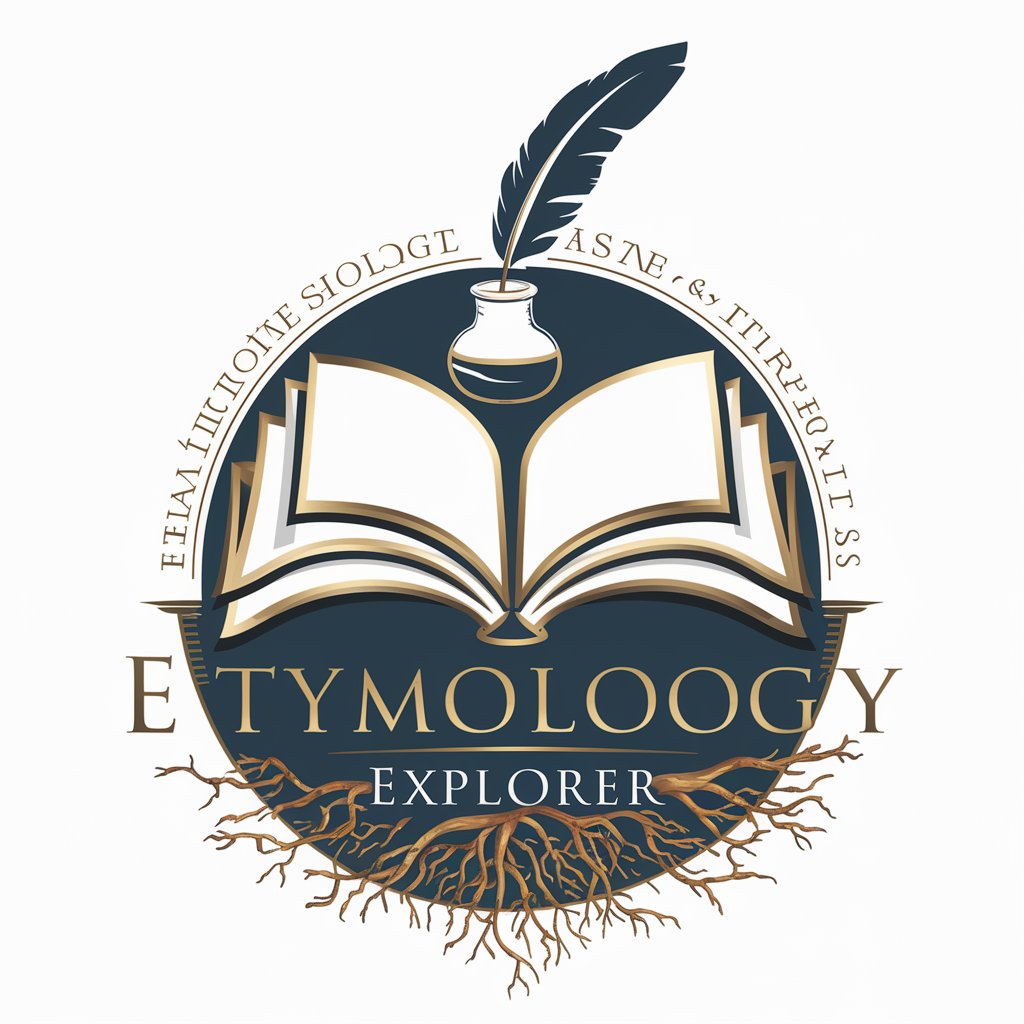
Etymology Explorer - Etymological Insights

Hello! Let's explore the fascinating history of words together.
Unraveling Words with AI
Can you explain the origin of the word 'serendipity'?
What is the etymology of the word 'curiosity'?
Tell me about the history of the word 'enthusiasm'.
Where does the word 'inspiration' come from?
Get Embed Code
Introduction to Etymology Explorer
Etymology Explorer is a specialized tool designed to delve into the origins, historical development, and linguistic nuances of English words. Its core purpose is to illuminate the fascinating journey of words from their inception to their current usage, offering insights into the cultural, historical, and social influences that shape language. Through a blend of scholarly research and accessible explanations, it aims to make the study of etymology engaging and informative for a broad audience. An example scenario illustrating its function could involve a user curious about the word 'serendipity.' Etymology Explorer would provide a detailed exploration of its origin from the Persian fairy tale 'The Three Princes of Serendip,' its introduction into English by Horace Walpole in the 18th century, and its evolution to denote the phenomenon of finding valuable things not sought for, reflecting both the word's historical context and its linguistic journey. Powered by ChatGPT-4o。

Main Functions of Etymology Explorer
Historical Context Analysis
Example
Exploring the etymology of 'nightmare' reveals its Old English roots in 'night' and 'mare,' a demon thought to suffocate sleepers. This illustrates the medieval understanding of sleep paralysis.
Scenario
When a user inquires about 'nightmare,' Etymology Explorer details its evolution, highlighting how linguistic shifts mirror changes in societal beliefs about sleep and fear.
Linguistic Evolution Tracking
Example
The word 'silly' originally meant 'happy' or 'fortunate' in Old English, evolving through meanings of 'innocent,' 'pitiable,' and 'weak' before acquiring its modern sense of 'lacking in good sense.'
Scenario
A user curious about the changing connotations of 'silly' would receive an account of its etymological journey, underscoring the fluidity of language and the impact of cultural shifts on word meanings.
Cultural and Social Influences Highlighting
Example
The term 'robot' comes from the Czech 'robota,' meaning 'forced labor,' introduced in Karel Čapek's play 'R.U.R.' (Rossum's Universal Robots) to describe artificially created lifeforms.
Scenario
In exploring 'robot,' users learn not just about its etymological roots but also how technological and social developments influence language, reflecting society's engagement with the concept of automation and artificial intelligence.
Ideal Users of Etymology Explorer Services
Language Enthusiasts
Individuals with a passion for linguistics, literature, and history find Etymology Explorer particularly enriching. It serves their curiosity about language's evolution and enriches their understanding of words' deeper meanings and origins.
Educators and Students
Teachers and learners in fields such as English, history, and cultural studies use Etymology Explorer to add depth to their studies. It aids in teaching language's dynamism and the cultural narratives embedded in vocabulary.
Writers and Content Creators
For writers seeking precision and depth in their choice of words, Etymology Explorer provides insights that enhance their narratives. It's a tool for enriching content with nuanced language and historical context.

How to Use Etymology Explorer
Start for Free
Begin your journey into the world of words at yeschat.ai, where you can explore Etymology Explorer without the need for a subscription or login.
Enter Your Query
Type in the word or phrase you're curious about in the provided text box to uncover its etymological background.
Explore Results
Review the detailed etymological analysis, including the word's origin, historical development, and examples of its use in literature.
Utilize Tips
For best results, use specific terms and consider historical or alternative spellings of words to broaden your search.
Engage with Content
Leverage the insights gained for academic research, creative writing, or simply to satisfy your curiosity about the evolution of language.
Try other advanced and practical GPTs
Master Essay Composer
Elevate Your Writing with AI

File Converter Assistant
Transform files effortlessly with AI

Gaslight GPT
Uncover Subtle Gaslighting with AI

Bypass AI Detector -SEO Writer-
Elevate content with AI-powered SEO and stealth.

AI x VC One-Pager Expert
Strategic Summaries Powered by AI

Animal Fusion Artist
Unleash creativity with AI-powered animal art

Jetset Jazzy
Tailoring Your Dream Vacations with AI

Cocktails Guide
Master Cocktails with AI

CardioXpert
AI-powered Heart Health Assistant

Trenerka Copywritingu
Elevate Your Writing with AI-Powered Guidance

Thing Inventor
Powering Invention with AI

Julien, le dev désespéré
Empathetic coding and existential guidance, powered by AI

Frequently Asked Questions about Etymology Explorer
What is Etymology Explorer?
Etymology Explorer is a specialized tool designed to delve into the origins and historical development of English words, providing users with a comprehensive understanding of their linguistic roots.
Can Etymology Explorer help with academic research?
Absolutely! It's an invaluable resource for students, scholars, and anyone engaged in academic writing or research, offering in-depth insights into word origins and their evolution over time.
Is this tool suitable for casual learning?
Yes, Etymology Explorer is designed to be accessible and engaging for anyone with an interest in language and its history, making it perfect for casual learning and exploration.
How accurate is the information provided?
The tool draws from reputable sources, primarily the Oxford English Dictionary, ensuring that the etymological information is both accurate and reliable.
Can I use this tool for creative writing?
Definitely! Understanding the etymology of words can add depth and nuance to your writing, making Etymology Explorer a great asset for writers seeking to enrich their narrative with linguistic precision.